Eve Smith's Blog
May 22, 2025
HOW TO BUILD WORLDS

I did a piece this week for an online writing magazine: writing.ie on authentic world-building.
As an author of standalone speculative thrillers, world-building is a critical skill in my armoury, and one of the aspects of writing I enjoy most. I invest a significant amount of time in conjuring up near-future worlds centred around my book’s premise. Each of my novels starts with a question that dictates the attributes and rules of its world.
My debut, The Waiting Rooms, questions what might happen if antibiotics no longer work, and a simple scratch can kill. Off-Target explores the consequences of allowing babies to be genetically ‘perfected’.
My third novel, ONE, set in a one-child-policy Britain, asks what might happen if birth was a crime in a world devastated by climate change.
And my latest thriller, The Cure, investigates the ramifications of a cure for ageing.
Once you understand your premise, you can get to work on fleshing out your world.
To make my novels feel authentic and plausible, I use five strategies.
Work out the rules of your world and apply them consistently.
I start with my central premise, my ‘what if…?’ and then think through all the possible ramifications: social, political, environmental, economic and technological.
What is different to our world now, and how has it changed? What is the same, and why? Once you know how your world operates, you can drip-feed this detail into the chapters in your book.
For example, in The Cure, a genetic cure for ageing has resulted in global population numbers rocketing as lifespan stretches way beyond a century. Here are just three of the ways that society is affected:
Marriage is obsolete as people transition through multiple long-term relationships: cohabitation contracts become the new norm.
Towns expand and merge into one continuous urban sprawl to fulfil housing and resource demands: the only green spaces left are virtual.
Food is grown in labs and vertical farms as there is no land available for the conventional farming of animals or crops.
Once you have agreed your rules, you need to stick to them. I make a list so I can refer back to them as I write, to ensure consistency.
It’s no good having your protagonist swan through a leafy park if you’ve established that green spaces no longer exist.

Make the familiar surprising.
I include details about recognisable products, processes or places that have changed in ways that underpin what’s different about my world, and I love using alternative narrative devices. I often incorporate adverts and news articles because they are concise vehicles for distilling information and flagging cultural or societal change.
For example, I start The Cure with an advert for an anti-ageing therapy, written in the style of a pain-relief medicine or beauty product. I include customer testimonials about how much younger and healthier people feel, as well as conventional marketing straplines such as: ‘’Your trusted vaccine against old age’ and ‘Helping you and your loved ones grow young’.
News articles are another great tool to convey important differences or shifts, avoiding the need for long passages of explanatory exposition. They are particularly helpful when your novel spans different time frames, as mine often do, and you need to bring readers up to speed with key events.
Don’t just think of your world visually.
It’s often tempting to rely on visual descriptions to convey details about a particular setting, but it’s important to remember the other four senses, too. What are the sounds of this new world, how are they different?
How does the air/food/water taste? What about smells? Are these recognisable or completely new?
A lot can be communicated about your world by showing how your characters respond to simple changes in smell, taste or touch.
In The Cure, my young investigator, Mara, has only ever experienced the sterile confines of a city so when she arrives in Jamaica, she is overwhelmed by the lush vegetation and exotic flowers, not to mention the roaming chickens and goats. As soon as she steps out of the airport, she is assaulted by an array of unfamiliar smells: ‘The salt breeze is laced with earthy vegetation, tantalising spices and more pungent, animal scents.’

Do your research, but be subtle. No info-dumping.
Research is an important part of my process as my thrillers explore medical, political and technological dilemmas. I believe that good research can really make or break your novel when it comes to plausibility, but you need to know how to use it and when to stop. At the end of the day, I’m writing a novel, not a science journal. Only a fraction of my research ends up in my actual copy. Most serves as background stimulus for the development of character, plot and setting. Even if I unearth the most fascinating nugget of information, it has to earn its place. Pace and accessibility are vital. Long, jargon-crammed passages showing off how much I know about a subject will likely lose my readers. Research should enhance the central premise and plot, not usurp them.
World-building is rooted in characters, too.
World-building isn’t just about the setting for my novels, it’s an integral part of characterisation.
How have the characters been moulded by the world around them, and how does this drive who they are and what they do? How do the rules of this world affect their motivations and values? Or their relationships?
The world should be informed by and reflected in my protagonists’ behaviour.
Mara, my twenty-five-year-old investigator in The Cure, is a product of the world she grew up in, where the very old vastly outnumber the young. A world where jobs for the younger generation are hard to find, and housing even harder. A world with major intergenerational divisions where the youth blame the elderly for destroying their planet and their prospects. This is why Mara becomes an Omnicide investigator, tasked with hunting down those who made or took the super-premium ageing cure. A personal tragedy during her childhood provides further impetus, triggered by events directly stemming from that cure.
If you are a budding author, I hope you find those strategies helpful. Do get in touch and let me know.
The Cure is out now, and available from all good bookstores in paperback, and also available online as an e-book and audiobook.

March 3, 2025
NOT ALL GRAILS ARE HOLY

Copyright © Emmy Grace Photographs
The recent furore over the horror film The Substance has left critics divided. The depiction of an ageing Hollywood aerobics instructor who injects an unlicensed, distinctly dodgy-looking serum in order to unleash a younger version of herself has been both slated and adored. Described by one critic as ‘a body horror, female-centric spin on The Portrait Of Dorian Gray’ the film was a surprise winner at The Golden Globes, and nominated for several Academy Awards although Demi Moore didn’t manage to clinch the coveted Oscar.
It paints a savage view of a misogynistic Hollywood that fosters impossible expectations of female beauty.
I have to say, I enjoyed it. Uncomfortable viewing without doubt, Moore gives a fabulous no-holds-barred performance which illustrates just how much people are prepared to risk to defy ageing and cling onto their youth.
These themes are not new.
History shows we have always nurtured a fascination with the idea of eternal youth. From Herodotus, and Alexander the Great’s fabled search for the Fountain of Youth, to legendary quests for the Holy Grail and the philosopher’s Stone: the desire to find a cure for ageing, whether that be elixirs, crystals, supplements or injections has obsessed scientists, artists and kings. And entrepreneurs.
An ever-expanding longevity industry is invested in fanning those flames, whether that be big pharma, the beauty industry or a profusion of biotech start-ups who want to tantalise us with technological solutions to old age. Because they know we are willing to pay for it. Which provides the perfect backdrop for my latest speculative thriller, The Cure.
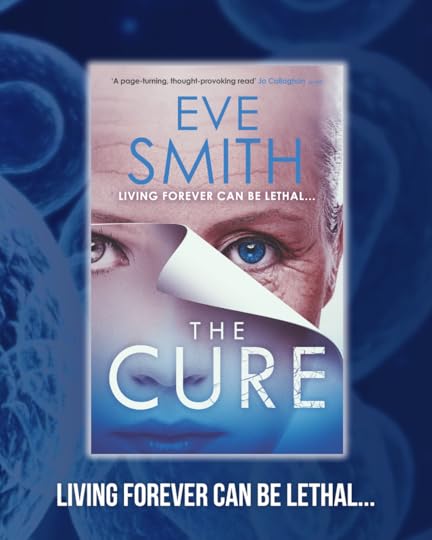
The Cure tells the story of a scientist, Ruth, who discovers a cure for ageing whilst researching the disease that killed her young daughter. Just one injection a year reverses your biological clock, guaranteeing a long, healthy life.
The novel explores the consequences of this discovery on society, relationships and the planet, and what might happen if we do indeed find that Holy Grail and drive human lifespan to a new high.
My fictional therapies in The Cure are based on scientific research that is happening now.
Huge sums are being invested in a diverse array of projects: from drugs that kill off damaged cells that accumulate during the ageing process and promote cellular repair to advanced gene therapies similar to the fictional ReJuve I use in The Cure. These therapies reprogramme cells to a more youthful state, halting and reversing the ageing process. The vision is to turn back the clock and cheat death by staving off age-related degenerative disease.
The pace and quantity of ageing research is accelerating, enabled by genetics, big data and AI and it is probable that we will see some variation of these treatments moving beyond clinical trials to market within the next few decades: sooner, if some advocates are to be believed.

Copyright © Getty Images
Some research projects have already produced remarkable results in rodents and primates.
The US FDA recently approved clinical trials for a drug that would extend lifespan in dogs.
But none of these improvements, as yet, have translated to humans.
David Sinclair, a professor in the department of genetics at Harvard Medical School and a famous advocate for longevity, believes the answer lies in the epigenome: the regulator of our genes which responds to environmental factors, by controlling the chemical modifications to our DNA and which genes are switched on or off as we age.
Through epigenetic reprogramming using specific ‘rejuvenation genes’, Sinclair has managed to accelerate and reverse ageing in mice, cure blindness by reprogramming retinal cells, and treat dementia, by reversing the age of rodent brain cells. Sinclair has embarked on further studies in monkeys and has even reversed the age of cultured human brain cells (organoids). He claims that clinical trials in humans are only a matter of months away.
But Sinclair has further ambitions. He believes the next stage of research is to investigate which molecules could imitate the results of these rejuvenation genes. If a molecular solution was found, it could mean a simple course of anti-ageing pills could be developed: a much cheaper and more accessible solution than gene therapies.
It’s hard not to get caught up in the excitement about these potential cures. But there remains an important if unpalatable question.
Just because we could do it, does that mean we should?

Copyright © Javier Miranda
“I’m an optimist. Anyone who believes in manipulating the human aging process is a terrible pessimist.— Leonard Hayflick, biomedical researcher
I don’t want to be alive when that’s possible. I don’t want to give another Adolf Hitler, a Saddam Hussein, another 50 years of life.
Every time someone like that dies a natural death, people should thank their God, whoever that might be, for the phenomenon of aging.”
The reality is that there is a social and environmental cost to such endeavours. And some fundamental ethical considerations that need to be addressed.
Given the dramatic rise in our global population, projected to exceed 10 billion this century, can the world cope with that many people living twice as long?
How will this play out when natural resources are already under threat, and living space at a premium, on a planet increasingly ravaged by climate change? When we are facing extreme weather events that impact lives and food production, with mass migration, starvation and poverty?
Is it fair that humans continue monopolising this planet at the expense of other species and habitats, when biodiversity is already plummeting?
Should medical funding be focused on age reversal when many long-standing preventable diseases are still prevalent in lower income nations such as TB, HIV and malaria, and infant, adolescent and maternal mortality rates are still way too high?
Who will ensure that everyone gets access to anti-ageing treatments which are likely to be very expensive at the outset? Will global regulatory consensus be possible to prevent a deepening of the chasm between rich and poor?
And should medicine be intervening where lifestyle and behaviour changes could avert many age-related conditions?
Is it right to medicalise solutions which might carry with them unknown adverse effects when we could stave off degenerative conditions if we ate better, drank and smoked less, and exercised and slept more?
I don’t have the answers to these questions. But they need to be aired.
Otherwise we delegate our collective fate to the companies and individuals racing full pelt to secure that Holy Grail.
THE CURE is published on April 10th and is available to preorder from all good bookshops.
It will also be available as an ebook and audiobook. You can
preorder here
.

Copyright © Jametlene Reskp
January 22, 2024
BEST NOVEL AWARD LONGLIST

I am delighted to announce that my speculative thriller, ONE has been longlisted for Best Novel in the British Science Fiction Association Awards. I am absolutely thrilled that ONE made the list, there are some fabulous books on there.
If you are a BSFA member you can vote for your favourites to make the shortlist here.
Voting closes on the 20th February, and winners will be announced at Eastercon, the national science fiction convention at the end of March.
Happy voting and good luck to all the other authors!

June 26, 2023
RIGHTING THE WRONGS
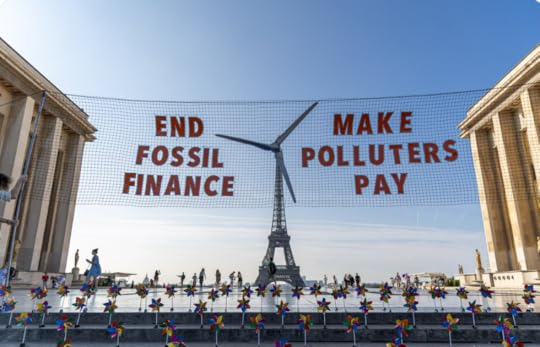
Climate activists transformed the Eiffel Tower with this banner for the Global Financing summit in Paris.
Last week, a group of leaders came together in Paris to discuss a new global financing pact.
Proposals included transforming financial mechanisms to help developing nations adapt to the punishing effects of climate change without embroiling themselves further in unsustainable levels of debt.
The ‘Bridgetown Initiative’ as it has been dubbed, is part of a set of measures attempting to address the increasing chasm between the global north and south as climate disasters exacerbate inequalities around the globe.
Opinions were divided on whether the summit was a success: key leaders were notably absent, including our own, and there were no concrete decisions on debt relief. Long overdue climate finance payments still fall far short of what is required.
But a roadmap for change was agreed, and its urgency was underlined by UN Secretary-General António Guterres in his characteristically eloquent opening words:
We can take steps right now – and take a giant leap towards global justice.
I urge you to make this meeting not just a cri du cœur for change, but a cri de guerre – a rallying cry for urgent action.
We are at a moment of truth and reckoning.
Together, we can make it a moment of hope.”
In my latest speculative thriller, ONE, a new UK government has implemented radical measures to adapt to a world ravaged by the climate crisis. Tired of broken promises, a public desperate for actions not words has voted in the ONE Party. One the surface, they appear to be managing things rather well.
Investment in climate tech and major shifts in policy and law have brought Britain self-sufficiency and security in food, water and energy. Air quality has been restored and excess carbon dioxide sucked from the air. Jobs are plentiful. Education and healthcare are good.
But this has come at a cost.

The UK is an Orwellian state. Everything is rationed, monitored and tallied against a weekly quota. What you eat and drink, the energy and transport you use, the things you buy.
Even how many children you can have.
A one-child policy is ruthlessly enforced, and intrusive surveillance makes it inescapable.
My protagonist, Kai, works in the Ministry of Population and Family Planning and is very good at her job. Until she turns up for work one day, and realises the illegal sibling on her Ministry hit-list is hers.
Like all totalitarian regimes, the ONE Party pitches endless propaganda lauding its successes, contrasting them with news reels flaunting the devastation and disasters overseas.
Huge swathes of people are forced to abandon their homelands to wildfires, floods and drought and migrate across continents. But far from supporting them, the ONE Party does everything within its power to keep climate refugees out.
This is the price UK citizens are willing to pay for keeping the lights on, for knowing there will be food on the table. For staying ‘safe’, while less fortunate nations burn or sink beneath the waves.
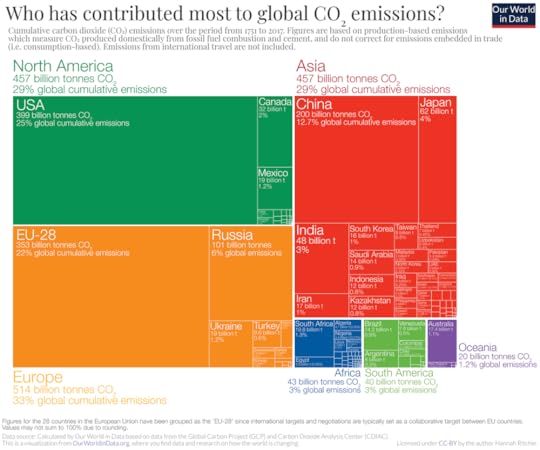
I sourced this tree map from Our World in Data. The size of each rectangle corresponds to the sum of CO2 emissions generated by each country from industrial production between 1751 and 2017.
The numbers are stark. They show that 28 European nations are responsible for generating a third of all emissions to date, and the USA is responsible for generating a quarter, which is twice the amount of China.
In contrast, most countries across Africa have been responsible for less than 0.01% of all emissions over the last 266 years. And yet they are the ones already bearing the brunt of the impacts.
The reality is that the UK, through luck of geography, wealth and tech will suffer much less from climate change impacts than many other nations. Most of whom are not responsible for generating those CO2 emissions in the first place. Those living in the equatorial band across the global south are most at risk and are the least prepared to deal with the climate crisis.
In many cases, their resources have been exploited for consumption by wealthier nations which means they are left without the ability to adapt. Even though they have done the least to create the problem.
Let’s not forget that greenhouse gases hang around in the atmosphere for hundreds of years, and carbon dioxide may last even longer, so the impact of these emissions will continue to be felt over multiple generations with dramatic effects on surface air temperature and ocean warming, and all the devastation such warming entails.

I don’t normally go heavy on charts in my blogs, but I had to include this one.
Of course, I knew logically this must be the case, but I had never seen the UK’s fossil fuel legacy presented so bluntly.
The UK may only contribute around one percent of global fossil fuel and industry emissions today, but this shows the historical burden that our industry had, and continues to have on our planet.
To me, these two charts encapsulate climate injustice. Consumption is the great divide.
And our history is marked by an ever widening gulf between the rich and the poor.
The poorest half of the global population generates just 10% of emissions.
Whereas the richest 10% of people generate over half the world’s emissions.
Which brings us back to the Bridgetown Initiative. Everyone deserves the right to live in a healthy environment. It’s not just about how countries are behaving now, although that is clearly very important, at some point there must be a reckoning and a rebalancing for what was done in the past.
According to Oxfam, the number of climate-related disasters has tripled in the past thirty years and these are now the number one cause of internal displacement.
We are about to see the largest migration in human history: the UN predicts there will be 1 billion climate migrants by 2050.
What will our response be?

Will we just pull up the drawbridge, and leave less fortunate nations to fend for themselves, as the ONE Party does in my book? Look after number one? Is that just?
Or will we face our responsibilities and help those people made homeless by climate change?
And put in place a global finance structure that not only enables developing economies to weather the coming storms, but to flourish, in a sustainable way.

Sharp perception and intense images shine out of every page.— Simon Conway
Eve Smith is a master storyteller for our troubled times.
May 16, 2023
WHEN FACT MEETS FICTION
I was at a crime fiction festival last week in Bristol, moderating a panel on ‘Science Fact & Science Fiction’. We had some good discussions, ranging from memory manipulation, to the pet science projects of billionaires, to gene-editing of children and the likely impacts of AI.
One question we debated was whether fiction has a role to play in highlighting issues and potential dangers in society, and if stories can engage people in a way news reporting or non-fiction can’t.
Of course I’m biased, but the consensus seemed to be yes.

I have had two novels published so far, both of which deal with issues that made the news last week.
My second novel, Off Target, is about a world where genetic engineering of babies has become routine. Embryos are edited to prevent heritable diseases and other more questionable conditions being passed down to future generations at the behest of well-intentioned parents. My protagonist, Susan, is faced with a terrible decision and takes things even further, making drastic changes to the paternal DNA of her unborn child.
Last week, the first three-person baby was born in the UK: a feat of genetic prowess, using the procedure MDT. Mitochondrial donation treatment (MDT) aims to stop babies inheriting incurable mitochondrial diseases which can often be terminal, using donor tissue from the egg of another woman during the IVF process. This prevents harmful genetic mutations being passed on from the biological mother, whilst retaining 99.8% of the parents' DNA.
The UK was the first country to legalise MDT, and whilst it does not go as far as the genetic procedures I write about in Off Target, it is still ground breaking, and for most of us, even just two decades ago, such a procedure would have seemed possible only in the realms of fiction.

My debut novel, The Waiting Rooms, is about an antibiotic-resistance crisis that prompts the government to pass a law which sacrifices the elderly to save the rest of the population from untreatable infections.
Last week, a Japanese film called Plan 75 was released in UK cinemas. Plan 75 is set in a near-future Japan that is teetering under the burden of its ageing population, with escalating violence against the elderly, and so the government introduces a programme which incentivises the over-75’s to accept voluntary euthanasia in exchange for a ‘preparatory grant’ of 100,000 yen.
So what, you might say, that’s fiction.
Only since its release in Japan last year, the film has attracted real-life advocates for the state-sponsored euthanasia scheme it presents, and in an interview with The Guardian, the director, Chie Hayakawa said, given the pressures Japan was facing and its attitude towards those vulnerable sectors of society considered ‘socially weak’ or overly dependent on the state, her film was ‘far from impossible’.

In The Waiting Rooms, the choice is even more stark. As new antibiotics are rendered ineffective within a matter of months after a spate of resistant infections, the drugs have to be strictly limited. Society has to make a choice. And who are the biggest users of antibiotics? The very young and the very old.
You can guess who takes the hit.
No one over the age of 70 is allowed new antibiotics. Instead, if they contract an infection, they are sent to hospitals for the elderly, nicknamed ‘The Waiting Rooms’ where they can choose to die a slow, natural death or be assisted in their deaths by trained nurses. Such a concept might have seemed fictional until we saw the tough choices being made in hospitals and care homes around the world when there weren’t enough ventilators or effective medicine during the COVID pandemic.
I started writing The Waiting Rooms eight years ago, way before the coronavirus pandemic, after reading a piece of research commissioned by the UK government which estimated that by 2050, ten million people globally would be dying of antibiotic-resistant infections every year.
Since then, the World Health Organisation has declared it one of the top 10 risks to global health and estimates that 4.9 million deaths annually are associated with antimicrobial resistance (AMR).
And it's not just overuse of antibiotics in healthcare and agriculture that is fuelling the problem. Climate change and pollution of our environment are accelerating the spread according to a UN report released in February this year. Pollution of waterways by hospital wastewater, run-off from pharmaceutical production and agricultural treatments, together with pollutants from poor sanitation, sewage and waste effluent in municipal systems are all making things worse.
We are confronted by a silent, slow-motion pandemic.— Mia Amor Mottley, President of Barbados, at the launch of the UN Report 'Bracing for Superbugs' at the Global Leaders Group on Antimicrobial Resistance
Our greatest fear is that [AMR] may well become the leading cause of death in the world.

The director of Plan 75 said she specifically made her film to avoid a state-sponsored euthanasia programme becoming a reality in Japan.
I’d like to think that breathing life into possible futures in the pages of my books could ward off those futures too, although as the great Margaret Atwood said, when asked if The Handmaid’s Tale was a prediction of events unfurling in America today:
“No, it isn’t a prediction, because predicting the future isn’t really possible: There are too many variables and unforeseen possibilities. Let’s say it’s an antiprediction: If this future can be described in detail, maybe it won’t happen. But such wishful thinking cannot be depended on either.”
Unfortunately, I tend to agree.
For more information about my books, including my latest speculative thriller One set in one-child policy Britain which is out this July, you can visit here.

March 16, 2023
ONE: NEW BOOK COMING SOON!

ONE LAW. ONE CHILD. 7 MILLION CRIMES.
I am so excited to share this amazing cover for my new speculative thriller, ONE, out July 20th.
Another dystopian nailbiter, my third novel is set in a one-child policy Britain ravaged by the climate crisis and is available for preorder now.
Huge thanks to my publishers Orenda Books for the fabulous design, I can’t wait to see it on shelf!
A cataclysmic climate emergency has spawned a one-child policy in the UK, ruthlessly enforced by a totalitarian regime. Compulsory abortion of ‘excess’ pregnancies and mandatory contraceptive implants are now the norm, and families must adhere to strict consumption quotas as the world descends into chaos.
Kai is a 25-year-old ‘baby reaper’, working for the Ministry of Population and Family Planning. If any of her assigned families attempt to exceed their child quota, she ensures they pay the price.
Until, one morning, she discovers that an illegal sibling on her Ministry hit-list is hers. And to protect her parents from severe penalties, she must secretly investigate before anyone else finds out.
Kai’s hunt for her forbidden sister unearths much more than a dark family secret. As she stumbles across a series of heinous crimes perpetrated by the people she trusted most, she makes a catastrophic discovery that could bring down the government … and tear her family apart.
Preorder from your local bookstore, or you can preorder on the links below.
I’ll be posting up what events I’ll be attending this year so keep an eye on the events page for more info!
Amazon Waterstones Bookshop.org Blackwells Apple Orenda Books
May 24, 2022
FROM TOMATOES TO GENOCIDE
Gene editing has made news headlines again this week, and some of its applications feel scarily close to the world of my speculative thriller, Off Target.
After being announced in the Queen’s speech, the Genetic Technology (Precision Breeding) Bill is being ushered forward by the UK government on the back of increasing food security concerns. The bill, if passed, will simplify regulation and pave the way for the commercial farming of gene edited crops and livestock in England.
Under EU law, any genetically modified or edited crops are prohibited because of safety concerns, as well as (in the past) vehement public opposition.
But in the wake of rising food prices and inflation, exacerbated by Russian blockades, the UK government is now taking a different view, citing an overly heavy reliance on food imports as well as the need for more sustainable farming practices.
‘Precision breeding technology’ as it is being dubbed, claims to make farming more resilient: better able to weather our changing climate as well as reducing fertiliser and pesticide use.
Crops can be edited to be more disease and drought resistant, with potential nutritional benefits such as the much-lauded tomatoes from Norwich, whose genes have been tweaked to boost our body’s production of vitamin D.

In my speculative thriller, Off Target, such laws have already been passed.
You can order chocolates genetically personalised to your nutritional and taste requirements.
Or red wine where the yeast has been edited to incorporate anti-inflammatory and anti-cancer properties, designed with the added benefit of never giving you a hangover, no matter how much you drink.
Both of these are based on real-life research, which only goes to prove that drinking wine may well be good for you…
Supporters of the proposed bill argue that the farming industry needs gene editing in agriculture to speed up the development of drought- and pest-resistant crops. They claim the UK risks being left at a competitive disadvantage as other countries forge ahead.
But others remain unconvinced, worried about the traceability of edited crops in the food supply chain, as well as their long term impact on our health and environment.
I will be interested to see which view prevails.
Off Target delves into more nefarious uses of genetic technologies too, where not only crops, but also humans can be genetically altered.

This editing of human embryos starts with the best of intentions, to prevent life-threatening diseases, but a genetic arms race ensues.
Unscrupulous fertility clinics and ambitious state-sponsored reproductive programmes attempt to weed out ‘undesirable’ traits and enhance others.
Which is where we get into dangerous territory that sadly links to a shocking news story that also broke this week: the release of photos and documents evidencing the imprisonment and abuse of China’s Uyghurs in so-called ‘education camps’.
The Xinjiang Police Files, as they are being called, were passed to the BBC earlier this year, and are part of a huge cache of data hacked from police servers, including the internment records for 20,000 imprisoned Uyghurs, a Turkic ethnic group living in northwest China.
The records show how big data is being used by the Chinese authorities to pry into these citizens’ lives, with digital surveillance tools relentlessly monitoring the content and conversations of ethnic minorities. Individuals are subjected to detention in internment camps, or worse, terrorism charges that rack up multiple prison sentences stretching for decades.
But digital surveillance is only part of the story.
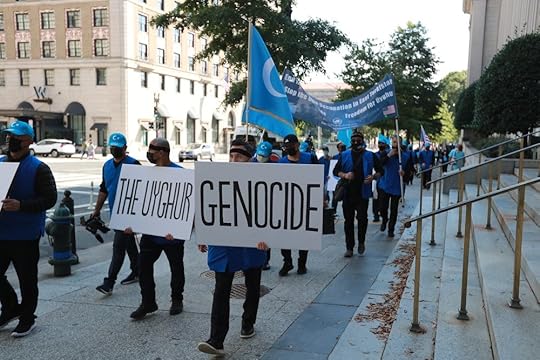
For the past decade, China has been using genetic surveillance to crack down on ethnic minorities: racially profiling minority groups without the proper informed consents.
In 2013, Chinese government authorities started collecting biometric samples from people residing in what is commonly known as the Tibetan Autonomous Region (TAR) under the pretext of offering a free annual physical check-up for residents. Reports indicate that almost 80 per cent (3 million residents) of the population was sampled.
A similar programme was rolled out in Xinjiang in 2016, where data from nearly all 23 million residents was collected, specifically targeting the Uyghurs.
In addition to blood samples for genetic profiling, high-definition photos, voice samples, fingerprints and iris scans were taken and stored in police databases.
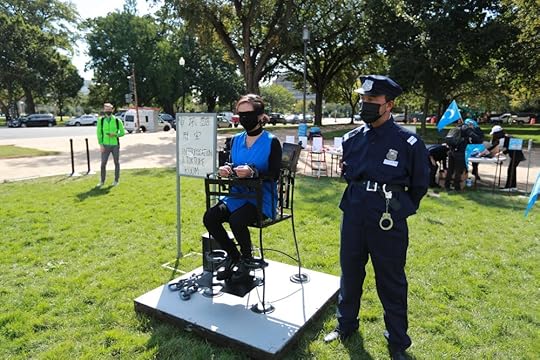
US Protests about the Internment of the Uyghurs
This covert, nonconsensual collection of DNA violates Chinese domestic laws and international norms governing the collection, use and storage of human genetic data.
According to a report by the Australian Strategic Policy Unit (ASPU) this is now being expanded to include the rest of the population, with China aiming to compile a national genomic database that will enable its security agencies to link DNA samples with a specific family or individual. They estimate it already contains around 140 million profiles. And US counterintelligence officials claim China’s DNA collection doesn’t stop there. BGI, a Chinese company that has contracts with health institutions in the West, developed a neonatal genetic test with the Chinese military that has enabled it to collect genetic data from millions of people around the world.
The Chinese government are developing the world’s largest bio database. Once they have access to your genetic data, it’s not something you can change like a pin code.— Edward You, US National Counterintelligence Officer
The photos and documents about China’s internment camps demonstrate only too vividly what this type of unfettered genetic surveillance can lead to: the deliberate targeting, monitoring and persecution of communities.
Which is why we need robust international governance of emerging genetic technologies as well as fearless investigation into its abuses.
Off Target, my latest genetic thriller is available in all formats and you can order it here .
February 14, 2022
TO TWEAK OR NOT TO TWEAK
There have been some interesting articles over the weekend inspired by the release of geneticist and broadcaster Adam Rutherford’s book: Control: the Dark History and Troubling Present of Eugenics.
I have a copy waiting for me at my local bookshop and can’t wait to get stuck in, as this subject is close to my heart.
The book illustrates how eugenics is embedded in our history, right back to the Spartans and Romans, through to the forced sterilisation policies practised in American states last century and the horrors of the Nazi regime, up to the modern day.

We might like to think we have moved on from unpalatable notions of human selective breeding to expunge ‘undesirable’ traits, and that higher concepts of freedom and equality have relegated eugenics to a shameful past. Sadly not. Rutherford discusses recent examples of involuntary sterilisations in Canada, China and India, to name but three.
One thing however, that has most definitely moved on, is the technology to manipulate our genetic code and rewrite our biological destiny. Which includes, according to some, the potential to actively manage and prevent not only inherited diseases, but also certain mental and physical characteristics.
And that is what makes this whole discussion so pertinent.
We don’t want to fall into the ethical trap cited famously by Dr Malcolm in Michael Crichton’s Jurassic Park:
"Your scientists were so preoccupied with whether they could, they didn't stop to think if they should"

For now, at least, the scientific majority has stopped to consider the ethical pitfalls of tinkering with human genomes. Not least the code-breaker herself, Jennifer Doudna, who, with her partner, Emmanuelle Charpentier, developed a method called CRISPR-Cas9 that revolutionised genome editing, and for which they received the Nobel Peace Prize in 2020.
Doudna has been vocal on her concerns about the nefarious abuse of her discovery.
She has spoken of a terrible nightmare where Adolf Hitler is introduced to her: he is wearing a pig face and asks her to tell him about her ‘amazing technology’.
A self-imposed moratorium on editing human embryos outside the lab may still be in force, but investment in gene editing research and the proliferation of biotech companies working in this area continue apace.
My latest thriller, Off Target, explores some of the social and moral quandaries that might arise should that voluntary moratorium be lifted.
Off Target is set in a world where genetic engineering of babies during IVF to prevent serious conditions has become routine. But, in some countries, less scrupulous clinics are offering a lot more than disease prevention, moving into the realm of selective enhancement, with disastrous consequences.
The book centres around this premise: how much would a parent risk for the ‘perfect’ baby?
The truth is that most parents want the best for their child, but at what point does well-intentioned parenting cross the line?
This question has been answered rather poignantly by Arthur Kaplan, Professor of Bioethics at New York University Langone Medical Center:
Renegade scientists and totalitarian loonies are not the folks most likely to abuse genetic engineering. You and I are - not because we are bad but because we want to do good.— Arthur Kaplan
In a world dominated by competition, parents understandably want to give their kids every advantage... The most likely way for eugenics to enter into our lives is through the front door, as nervous parents ... will fall over one another to be first to give Junior a better set of genes.
Something to ponder.
In what I gleaned from the articles, Adam Rutherford argues that complex genetic changes leading to the enhancement of mental or physical human traits will not be within the bounds of possibility, safely, any time soon. Safely being the operative word.
But, given the speed at which this technology is advancing, and the dollars dedicated to exploring such possibilities, you have to wonder if scientific ambition might yet take us by surprise.
Off Target is published on 17th February and is available from all good bookstores, or you can
order here
. It is also available as an audio and ebook.
More background on genetic dilemmas and other inspirations for my book are
available here
.

January 21, 2022
AUDIOBOOK ALMOST HERE!
SO excited to share with you this interview I did about Off Target ahead of the audiobook’s release on the 1st February. The interview is with one of the narrators, who plays Susan: the lovely Candida Gubbins.
I talk about the inspiration behind my genetic thriller, some of its many moral dilemmas and the challenges faced by my protagonist, Susan.
The other narrator is Julia Barrie who also does an amazing job. The book is produced in studios just down the road from me in Oxford at Isis Audio, which is very handy!
You can preorder on Audible here: https://amzn.to/3FPoOm4 and it will be available on all audio platforms and also on CD from libraries. I hope you enjoy!
December 18, 2021
OFF TARGET: EBOOK OUT NOW
I am delighted to share with you the book trailer for my latest speculative thriller: Off Target, set in a world where genetic engineering has become the norm for humans and governments have embarked on a perilous genetic arms race.
You can read the full synopsis here.
The ebook is now prepped and ready to zoom straight onto your favourite digital reading device, and the audiobook is following hot on its heels on February 1 and the paperback February 17.
Available for order now!
Check out some early reviews by authors below.
A fantastic exploration of the ethics & allure of genetic engineering woven into a captivating, thought-provoking thriller. Provocative, pacy & scarily all-too-possible— Philippa East
This is what speculative fiction should be - plausible, pacy, and with a story that packs real emotional punch. Absolutely gripping!— Louise Mumford
… a brilliantly chilling work of speculative fiction - a disturbing but all-too-possible vision of the near future, where each of us gets to play God. Superb!— Guy Morpuss
What a bold, unique and topical read this was, set in a dark future world when genetic engineering is the everyday and you can literally create the baby of your dreams. I was hooked! Read it in two sittings!— Louise Beech




